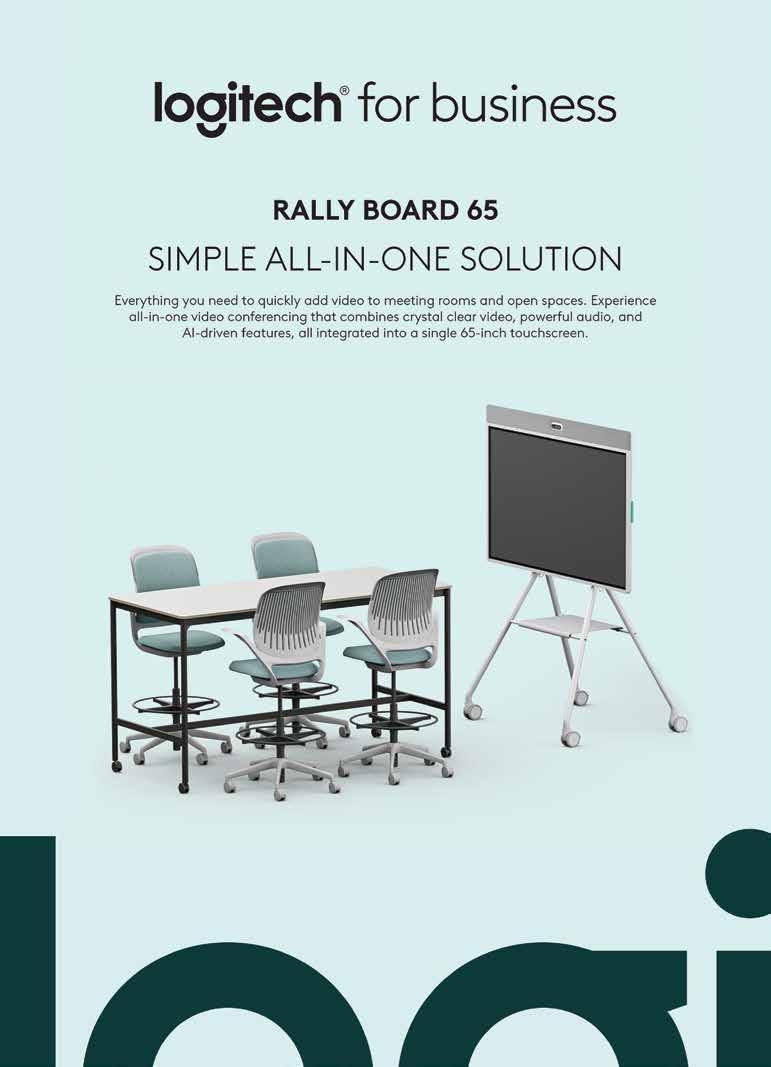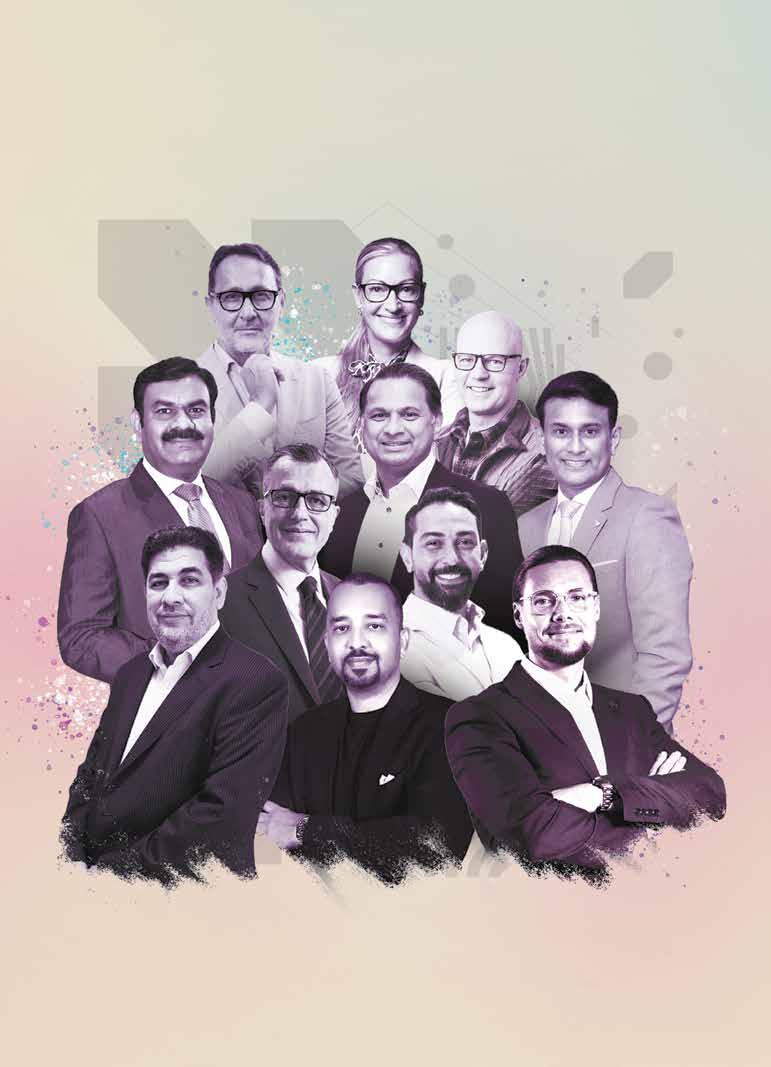












s we arrive at a point where we can start to quantify the value of emergent technologies trends, it is important to remember that the tech industry is only where it is due to leadership that can chart a stable course to operational success. Their leading strategies must constantly be tempered between excitement and pragmatism. In order to meet the demands of an evolving industry it becomes important to think in the long-term to mitigate risk.
A sentiment shared by all these leaders is their interest in the responsibility of supporting digital economy agendas on a national level. From private-public sector collaborations to the competitive advantage afforded by Agentic AI, there is very little outside of their spheres of expertise. To be a visionary is to be someone who is mindful of both the journey and the destination in all aspects of their circumstance.
Via the Tech Vision supplement, CPI Media is putting the industry visionaries responsible for navigating emerging trends and supporting regional initiatives at the forefront. They know where they stand in this 'AI era'. The only question is, do you? We hope you enjoy reading this magazine as much as we enjoyed putting it together!

Daniel Shepherd Deputy Editor Tahawultech.com
E-mail: daniel.shepherd@cpimediagroup.com
Facebook: www.facebook.com/TahawulTech
X: @TahawulTech
Instagram: @TahawulTech
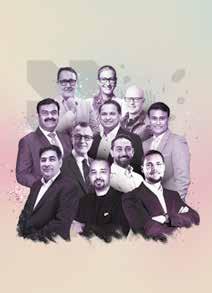



S.M. Hussaini, CEO, Almoayyed Computers Middle East (ACME) discusses how the organisation plans to contribute to national digital economy agendas and the importance of striking a proper balance between rapid adoption and security alignment when using emerging AI technologies.
How do you see your organisation contributing to the region’s bold and ambitious national digital economy agendas and where do you believe private–public collaboration will be most critical in achieving these ambitions? Digital is the way forward— not only for our market, but for markets globally. I see this as both a responsibility and an opportunity. ACME is strongly aligned with Bahrain’s and the wider region’s digital agendas, which focus on skill development, innovation, and ultimately, technology leadership. We not only enable technology adoption but also play an advisory role by introducing global best practices to our market. As an IT company, we are investing in a comprehensive ecosystem— covering skills, digital platforms, modern/AI solutions, and secure infrastructure— that helps our customers across government entities and enterprises accelerate the adoption of digital technologies and take a lead in
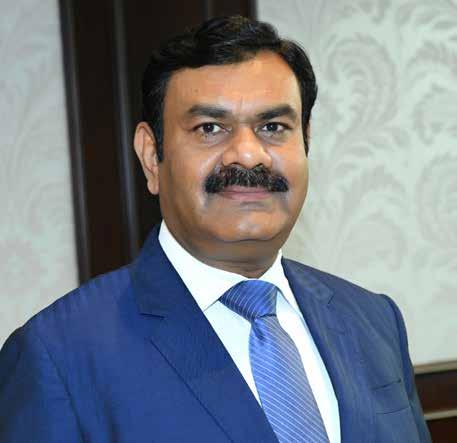


delivering smarter services and better experiences to their end customers.
Private–public collaboration is critical in areas such as digital skills development, local innovation, and creating a marketplace that supports the adoption of local innovations.
The private sector is wellpositioned to take the lead in implementing the Government’s digital economy vision.
As emerging technologies such as Gen AI and Agentic AI continue to reshape industries, how do you strike the right balance between rapid adoption for competitive advantage and ensuring resilience, security and regulatory alignment?
The key is not just to adopt—but to adopt with clear objectives defined in advance. Gen AI and Agentic AI can have a wide impact across all our activities and processes. However, as with any other technology, rushed
Conforming to regulatory guidelines is a key challenge, especially as these guidelines are evolving rapidly.
implementations will not deliver the desired outcomes. Based on business priorities and technology imperatives like security, a phased-out approach can be adopted while continuously measuring the outcomes. Scaling up or down can then be decided based on those outcomes.
Given the broad scope of Gen AI and Agentic AI, conforming to regulatory guidelines is a key challenge, especially as these guidelines are evolving rapidly. An outcome-based implementation strategy works well, as it allows for adjustments to ensure compliance as required.
What role do you believe technology leadership should play in redefining business models and creating new value ecosystems across the Middle East?
Technology leadership today is about creating new business models and is all-
encompassing, regardless of the business sector. Additionally, it aims to deliver a connected approach to providing better services and enhanced experiences for the users of technology. The scope of this impact can be further amplified through increased cross-industry collaboration. The potential value created through such collaboration can be enormous. Moreover, the impact can be even greater if cross-border collaboration is enabled, guided by common objectives and uniform technology adoption. Connected tourism, connected healthcare, connected financial services—the possibilities are endless. Together, the ecosystem can fuel innovation far more rapidly than any single entity could achieve alone.
Looking ahead, which transformative technologies do you believe will define the region’s global standing over the next decade; and how are you preparing your organisation to lead in that shift?
The region has the opportunity to leapfrog in global standing, thanks to the keenness shown by the region in strengthening digital infrastructure and embracing AI. This, in turn, will create multiple streams of industry-specific activities, such as HealthTech, Digital Finance, and Smart Governance. Given the rapid pace of technological change, we risk becoming irrelevant if we do not prepare by aligning and remodelling our business practices. Fortunately, at ACME, we have already begun preparing ourselves by investing in talent—through reskilling existing employees and onboarding fresh talent— and by building a partner ecosystem that will help ease our transformation and enable us to deliver meaningful solutions faster to our customers. Our practices are built around Cloud and Modernisation and we are now ready to make a significant impact with AI Solutions and AI Services.
Pierpaolo Taliento took the time to address their proposed role in the digital economy and excitement over collaborations between AI and humans in a secure work fabric.



How do you see your organisation contributing to the region’s bold and ambitious national digital economy agendas and where do you believe private–public collaboration will be most critical in achieving these ambitions?
Across the Middle East, everyone’s talking about the digital economy, but none of it works without trust. That’s where Citrix comes in. We help organisations secure how people work via apps, data, and devices. No matter where they are.
The real opportunity lies in public–private collaboration.
Governments set the ambition; the private sector provides the speed and innovation to make it happen. Citrix’s role is to bridge the two, enabling governments and enterprises to modernize safely, build hybrid clouds confidently, and prepare their
Citrix helps create that safe layer between your users, your data, and your AI systems”.
workplaces for the AI-driven economy ahead.
As emerging technologies such as Gen AI and Agentic AI continue to reshape industries, how do you strike the right balance between rapid adoption for competitive advantage and ensuring resilience, security and regulatory alignment?
AI is moving fast, but security still needs to move faster. Everyone wants to plug in generative or agentic AI tools, but the real question is: Can your data handle it?
Citrix helps create that safe layer between your users, your data, and your AI systems. Through Zero Trust, contextual access, and secure app delivery, we make sure AI operates inside defined, trusted boundaries — no data leakage, no shadow tools, no surprises.
That way, organisations
can explore and experiment with AI, without compromising compliance or resilience. In short: innovate boldly, but safely.
What role do you believe technology leadership should play in redefining business models and creating new value ecosystems across the Middle East?
Technology leaders today aren’t just running IT; they’re redesigning how business works. Our role at Citrix is to help them turn security and simplicity into growth enablers.
We’re helping companies move from isolated systems to connected, intelligent workspaces, where people, partners, and even AI agents can collaborate securely across clouds and borders. When that happens, new ecosystems appear, faster decisions, smarter services, and trust built right into the flow of work. That’s where true digital transformation begins: not in new tools, but in how safely and seamlessly people can work together.
Looking ahead, which transformative technologies do you believe will define the region’s global standing over the next decade; and how are you preparing your organisation to lead in that shift?
If I had to pick the big ones: secure cloud, AI, and digital identity. Together, they’ll redefine how the region competes globally.
Citrix is preparing by evolving our platform from a digital workspace into what we call a secure work fabric, a space where humans and AI agents can work side by side, safely and efficiently.
Imagine your digital workspace anticipating your needs, protecting your data, and letting AI handle routine tasks, all while you stay in control. That’s where we’re heading. And that’s how we help organisations across the region stay ready, not just for today’s challenges, but for the opportunities AI is bringing tomorrow.


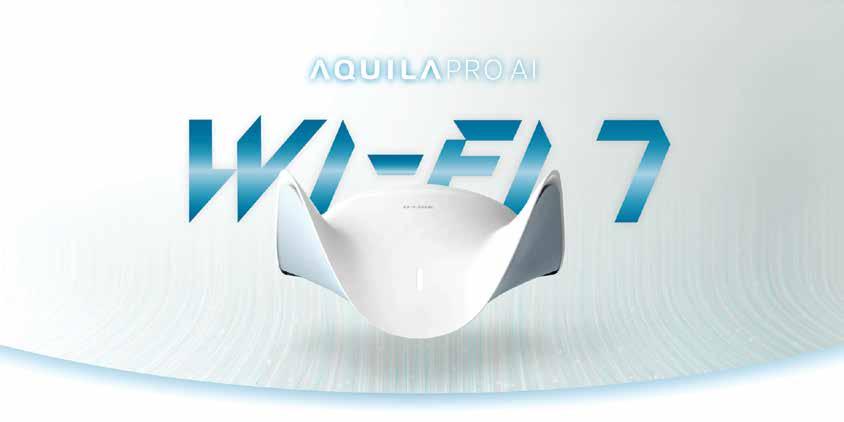





How do you see your organization contributing to the region’s bold and ambitious national digital economy agendas, and where do you believe private–public collaboration will be most critical in achieving these ambitions?
At D-Link, we believe connectivity is the backbone of every digital economy. Our role is to make networks reliable, reasonable, and secure—whether for homes, businesses, or governments. By enabling smart cities, education, and e-services, we help bring national visions to life. Public–private collaboration is critical to bridge gaps and accelerate adoption. When we work together, the whole ecosystem benefits.
As emerging technologies such as Gen AI and Agentic AI continue to reshape industries, how do you strike the right balance between rapid adoption for competitive advantage and
ensuring resilience, security, and regulatory alignment?
The pace of Gen AI and Agentic AI is exciting, but adoption must be thoughtful. At D-Link, we build security and compliance into every product, from enterprise switches to AQUILA PRO AI smart Wi-Fi. At D-Link, we focus on innovation while building resilience, security, and compliance into everything we do. It’s about moving fast, but responsibly. For us, speed and safety must go hand in hand. That balance is what creates sustainable advantage.
What role do you believe technology leadership should play in redefining business models and creating new value ecosystems across the Middle East?
Technology leadership today means rethinking how value is created. With AI-driven connectivity like AQUILA PRO AI,
Speed and safety must go hand in hand. That balance is what creates sustainable advantage.
we’re showing that networks are no longer just utilities—they’re intelligent enablers of new services and revenue streams. True leadership is about enabling growth for everyone in the value chain. That’s how we create longterm value together.
Looking ahead, which transformative technologies do you believe will define the region’s global standing over the next decade, and how are you preparing your organisation to lead in that shift?
The next decade will be shaped by AI, 5G, IoT, and cloud— technologies that will transform the region’s global standing. They’ll redefine how we connect, work, and live. At D-Link, we’re already preparing with smarter, greener, AI-driven networking solutions. Our mission is to make sure every household and business is ready for that digital

Art Gilliland, Chief Executive Officer at Delinea examines the value of public-private sector collaboration in achieving national economy agendas and the role of identity security in digital ecosystems as part of our interview series.
How do you see your organisation contributing to the region’s bold and ambitious national digital economy agendas and where do you believe private–public collaboration will be most critical in achieving these ambitions?
At Delinea, we believe that secure digital identity is the foundation of every successful digital economy. Across the Middle East, governments are pursuing ambitious transformation programs that prioritise innovation, trust, and sovereignty – from Saudi Arabia’s Vision 2030 and National Data & AI Strategy, to the UAE’s Digital Government Strategy 2025 and Sovereign Cloud initiatives. These programs all share a common thread: a commitment to data sovereignty, responsible AI, and zero-trust principles that protect national interests while enabling global competitiveness.
Delinea contributes to these goals by helping organisations establish identity-first security architectures that provide complete visibility and control over every human, machine, and AI identity across hybrid and multi-cloud environments. This aligns directly with regional efforts to ensure data stays protected within national borders, AI systems are governed responsibly, and access is granted only when and where it’s needed.

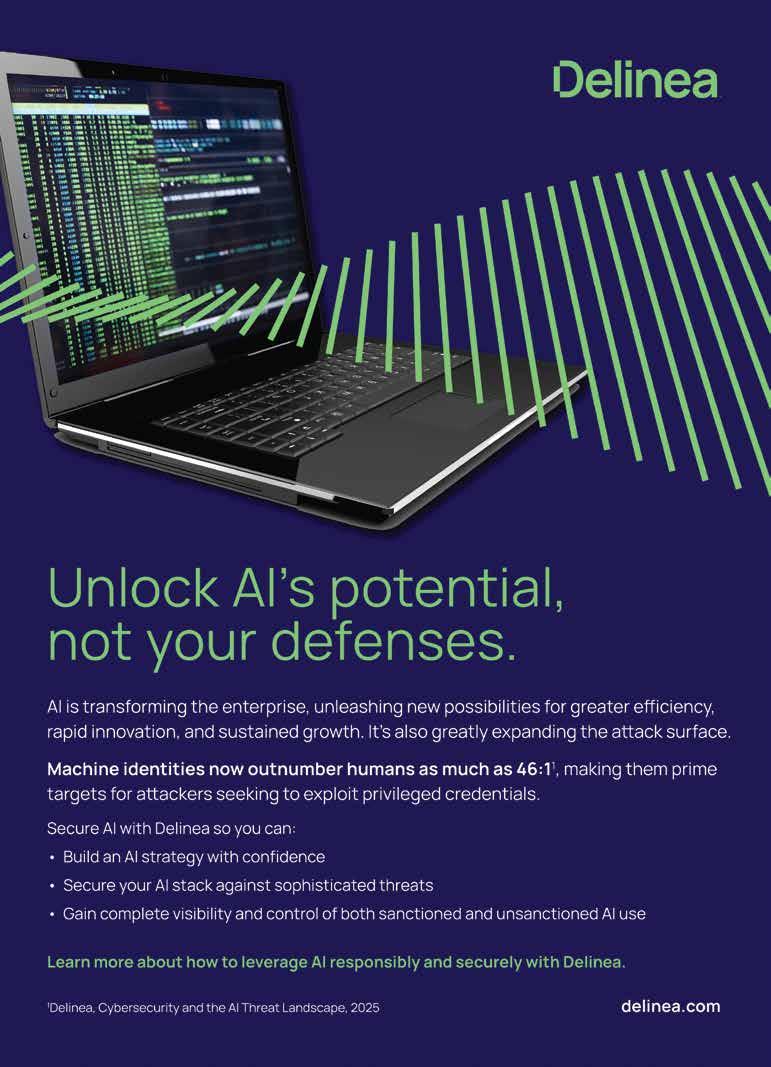

Public-private collaboration will be especially critical in three areas:
1. Sovereign cloud and AI infrastructure: Governments and technology providers must co-develop frameworks that uphold local data control while enabling innovation at scale.
2. Responsible AI governance: Shared standards and AI councils can bridge policy and practice, ensuring safe, compliant adoption of generative and agentic AI.
3. Zero-trust and identity modernisation: As national economies digitize, private partners can help accelerate the deployment of zero-trust architectures that secure the expanding identity fabric across sectors.
By combining national vision with private-sector innovation, the region can create a resilient digital foundation built on security, trust, and shared accountability.
As emerging technologies such as Gen AI and Agentic AI continue to reshape industries, how do you strike the right balance between rapid adoption for competitive advantage and ensuring resilience, security and regulatory alignment?
AI governance, not restriction, is the key to striking that balance. Generative and agentic AI can deliver enormous productivity and innovation gains, but only if organisations maintain control and visibility over how these tools are being used. Delinea’s research shows that 93% of organisations have already experienced some form of shadow AI use, highlighting a gap between policy and practice. We help organisations strike the right balance by putting flexible guardrails in place, like identity-first access controls for both humans and AI agents. This allows organisations to innovate safely, ensuring AI adoption aligns with an organisation’s risk appetite, regulatory requirements, and long-term

resiliency strategies. The goal isn’t to slow AI down, but to make it secure by design.
What role do you believe technology leadership should play in redefining business models and creating new value ecosystems across the Middle East?
Technology leaders now sit at the intersection of innovation and risk. In the Middle East, where digital transformation is accelerating at national scale, their role is to enable secure experimentation by helping organisations embrace AI, automation, and cloud technologies without compromising security or compliance.
CIOs and CISOs must move from being policy enforcers to architects of trust. By embedding identity security and governance into the fabric of digital ecosystems, they can unlock new business models built on secure data sharing, intelligent automation, and cross-sector collaboration. At Delinea, we partner with technology leaders across the region to help them transform identity from a control point into a catalyst for innovation, trust, and growth.
By combining national vision with private-sector innovation, the region can create a resilient digital foundation built on security, trust, and shared accountability.
Looking ahead, which transformative technologies do you believe will define the region’s global standing over the next decade; and how are you preparing your organisation to lead in that shift?
We believe the next decade will be defined by intelligent identity ecosystems, powered by AI, automation, and secure cloud platforms. As the Middle East positions itself as a global hub for digital innovation, technologies such as agentic AI, machineto-machine management, and autonomous security systems will be central to that vision.
Delinea is preparing for this shift through our Delinea Platform, powered by Iris AI, which provides full visibility and control over every identity –human, machine, and AI. The platform automates discovery, classification, and governance of all privileged accounts, enforcing just-in-time access and continuous monitoring to prevent misuse or compromise. We see our role as enabling the region’s organisations to innovate with confidence by embracing AI and emerging technologies knowing that their identity security is strong, resilient, and future-ready.

Petra Schirren, President for Gulf at Ericsson Europe, Middle East and Africa, addresses the company's support for national digital economy agendas such as 'We the UAE 2031' and their use of logistical insights from mobility reports to enable ecosystem co-creation across the region.

How do you see your organisation contributing to the region’s bold and ambitious national digital economy agendas and where do you believe private–public collaboration will be most critical in achieving these ambitions?
At Ericsson, we actively support the Middle East’s ambitious digital economy agendas by partnering with governments and telecom operators to modernise digital infrastructure and foster innovation.
In the UAE, our collaboration with national efforts such as the “We the UAE 2031” agenda focuses on building advanced 5G networks, enabling smart cities and developing digital public services. Initiatives like the Gen-E Graduate Program and Excelerate&, in partnership with e&, underscore Ericsson’s commitment to nurturing a highly skilled digital workforce with training in 5G, AI, and cloud computing.
According to the Ericsson Mobility Report the region is projected to reach over 90% 5G penetration by 2030, positioning the Gulf as one of the most advanced 5G markets globally — a key enabler for digital transformation and economic diversification.
Public–private collaboration is essential for achieving these bold ambitions. Ericsson plays a pivotal role in co-developing frameworks for progressive spectrum policies, piloting AI-powered innovations and advancing sustainable and resilient infrastructure. By fostering joint innovation centres and aligning national strategies, Ericsson empowers the region to become a global technology hub, driving transformative growth across sectors such as smart mobility, e-health, and IoT solutions.
As emerging technologies such as Gen AI and Agentic AI continue to reshape industries, how do you strike the right balance between rapid adoption for competitive advantage and ensuring resilience, security and regulatory alignment?
Ericsson recognises the transformative potential of GenAI and Agentic AI in reshaping


industries while emphasising a balanced approach to adoption. We work closely with governments and telecom operators to align with digital economy strategies like the UAE Vision 2031, Oman’s Vision 2040, modernising infrastructure and enhancing regulatory frameworks to support innovation responsibly.
To ensure resilience and security, Ericsson co-develops open, investment-friendly spectrum policies and prioritises sustainable network development. Our R&D investment focuses on AI-driven networks designed to enhance performance while adhering to stringent data privacy and cybersecurity standards.
Lastly, we actively invest in local talent development through graduate programs, STEM education and tech academies, emphasising digital upskill to drive a knowledge-based economy. By integrating innovation with regulatory alignment, Ericsson empowers businesses to leverage AI’s competitive advantages and ensures transformative technologies are deployed securely and ethically for longterm sustainability.
What role do you believe technology leadership should play in redefining business models and creating new value ecosystems across the Middle East?
Technology leadership is fundamental to redefining business models and creating interconnected value ecosystems across the Middle East. At Ericsson, we believe leadership extends beyond connectivity, enabling telecom operators to unlock new revenue streams through network APIs, digital platforms and tailored solutions for verticals like logistics, smart manufacturing and financial services.
Ericsson champions open innovation by fostering collaborations with startups, academia and governments to develop scalable solutions that align with regional economic goals. By leveraging 5G and AI, we empower operators to transition into full-scale tech companies capable of delivering transformative cross-sector solutions, from private networks to IoT and digital healthcare.
The Ericsson Mobility Report reinforces this leadership opportunity, with the region expected to achieve over 86 million 5G subscriptions by 2030, driving exponential growth in enterprise and industrial digitalisation.
Our focus on enabling ecosystem co-creation goes hand in hand with shaping policies supportive of innovation and investment. Through technology leadership, Ericsson aims to drive disruptive innovation, enhance customer value and ensure the Middle East remains a global frontrunner in digital transformation.
Looking ahead, which transformative technologies do you believe will define the region’s global standing over the next decade; and how are you preparing your organisation to lead in that shift?
Ericsson aims to drive disruptive innovation, enhance customer value and ensure the Middle East remains a global frontrunner in digital transformation.
Ericsson identifies 5G Advanced, generative AI, specialised IoT solutions and mission-critical networks as the transformative technologies that will shape the Middle East’s global competitiveness over the next decade. These advancements will drive productivity gains and unlock innovative business models critical to the region’s economic growth.
To lead this shift, Ericsson is advancing R&D in 6G and 5G Advanced in collaboration with regional partners like e&, while accelerating the rollout of sustainable network technologies that reduce energy consumption by up to 40%.
Internally, Ericsson is investing in workforce skill development, automation and cloud-native architectures to lead the convergence of emerging technologies. By preparing operators and industries for an increasingly digital and interconnected future and to deliver differentiated connectivity, Ericsson ensures the Middle East is equipped to excel in a competitive global landscape while fostering sustainable, techdriven growth.





Ossama El Samadoni, General Manager at GBM Dubai, delves into their longstanding commitment to the region and belief in strong technology leadership in this exclusive interview.
How do you see your organisation contributing to the region’s bold and ambitious national digital economy agendas, and where do you believe private–public collaboration will be most critical in achieving these ambitions?
At GBM, we see our role as a trusted partner in helping governments and enterprises translate their bold visions into tangible outcomes. For over 35 years, with our local roots and global standards, we’ve had the privilege of supporting both public and private sector organisations across the region by building secure, scalable digital foundations and enabling organisations to embrace innovation with confidence.
We firmly believe that the path to achieving these ambitions lies in robust public–private collaboration. Transforming the digital economy requires tackling complex challenges, such as strengthening cybersecurity frameworks, accelerating AI adoption, and ensuring equitable access to technology. The private sector contributes unparalleled global expertise, agility in deploying emerging technologies, and access to innovative solutions, while the public sector provides the vital leadership, policy frameworks, and scale to ensure these efforts align with long-term societal goals.

Where the collaboration becomes most critical is in creating secure, resilient digital infrastructures and nurturing local talent. By combining technical innovation with human capital development, we can ensure that transformation is about technology adoption and building lasting capabilities within the region.
We remain deeply committed to walking this journey with our partners, helping the region not only keep pace with global change but lead it in a way that reflects local priorities and ambitions.
As emerging technologies such as Gen AI and Agentic AI continue to reshape industries, how do you strike the right balance between rapid adoption for competitive advantage and ensuring resilience, security, and regulatory alignment?
We at GBM see technologies like Generative AI and Agentic AI as powerful enablers of innovation, but we also recognise that they must be adopted responsibly. Striking the right balance starts with listening to our clients’ business priorities and helping them identify use cases where these technologies deliver real value. Equally important is ensuring resilience and security from the outset. We take a layered approach that combines robust governance, trusted architectures, and strong
cybersecurity controls. This way, organisations can innovate confidently while safeguarding their data and operations. Regulatory alignment is another pillar. We help our clients navigate this landscape and remain compliant without slowing innovation. In short, the balance lies in moving decisively, while anchoring every step of adoption in trust, resilience, and long-term sustainability.
What role do you believe technology leadership should play in redefining business models and creating new value ecosystems across the Middle East?
Technology leadership today is about helping organisations rethink how they operate, compete, and create value. In the Middle East, where governments and enterprises are driving some of the most ambitious transformation agendas in the world, technology leaders play a pivotal role in contributing to this vision.
At GBM, we believe technology leadership extends beyond technology enablement. This could mean guiding organisations to reimagine business models, moving from product to servicedriven approaches, building datadriven enterprises, or embracing platform-based ecosystems that bring together partners, customers, and innovators.
For over 35 years we’ve had the privilege of supporting organisations across the region by building secure, scalable digital foundations.

There is also significant discussion around the scope of fostering collaboration across industries. Many of the region’s next growth opportunities will come not from isolated efforts but from connected value ecosystems in areas like smart cities, energy transition, and digital health. Ultimately, we believe technology leadership should empower organisations to navigate uncertainty with confidence, while simultaneously unlocking new opportunities for growth and resilience across the region.
Looking ahead, which transformative technologies do you believe will define the region’s global standing over the next decade, and how are you preparing your organisation to lead in that shift?
Over the next decade, we believe key transformative technologies will be central to shaping the region’s global standing. Artificial intelligence in all its forms— generative, agentic, and beyond— will fundamentally redefine how industries operate and innovate. Alongside AI, advancements in cloud computing, cybersecurity, and digital infrastructure will continue to underpin resilience and scalability. We also see significant opportunities in sustainable technologies, from smart energy management to digital solutions that support national sustainability agendas.
At GBM, our expertise is guided by a deep understanding of regional ambitions and strengthened by global best practices. From building secure, adaptable digital architectures to nurturing local talent poised to lead this transformation, we remain committed to anticipating and addressing the challenges of a rapidly evolving technological landscape.
Most importantly, we see our role as enabling customers to adopt these technologies in a way that is not only fast but also inclusive, sustainable, and rooted in trust. By doing so, we help support organisations in the region to lead the technological shift while anchoring progress in values that resonate across the board.

Ahmad Fida, Chief Security Officer at LinkShadow, delves into the strategic considerations involving emerging AI technologies and the importance of fostering innovation in this exclusive interview.
How does your organisation envision contributing to the region’s ambitious AI -driven cybersecurity initiatives, and in which areas do you see private–public collaboration as most vital to advancing these security and innovation goals? We are dedicated to harnessing cutting-edge AI technologies to enhance overall security postures significantly. By actively engaging in regional AI initiatives, we strive to drive innovation and facilitate the exchange of best practices that uplift the entire ecosystem. Strategic partnerships between the public and private sectors are fundamental, enabling the consolidation of resources, expertise, and intelligence essential for effectively countering sophisticated cyber threats.
As emerging technologies such as Gen AI and Agentic AI continue to reshape industries, how do you strike the right balance between rapid adoption for competitive advantage and ensuring resilience, security, and regulatory alignment?
To maintain a well-balanced approach between rapidly
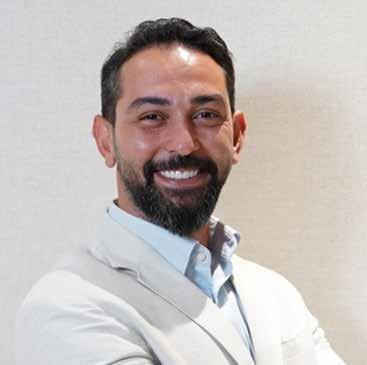















adopting emerging technologies such as Generative AI and Agentic AI, while ensuring resilience, security, and compliance with regulations, several key elements must be integrated:
First, closely monitoring usage of AI systems is essential. This includes tracking activity to detect deviations or misuse and enforcing fair usage policies that define limits and acceptable behaviours for AI tool consumption. Such policies ensure that resources are used responsibly without excessive or inappropriate use that could introduce security or operational risks.
Second, ongoing awareness and education initiatives are vital to equip all stakeholders with knowledge about the capabilities, risks, and ethical considerations surrounding AI deployment. These programs also reinforce compliance requirements and promote cautious handling of AI-generated content. Third, it is critical to embed regulatory requirements into the AI governance framework. This includes adhering to data privacy laws, cybersecurity frameworks, and the emerging landscape of AIspecific policies. A comprehensive Generative AI usage policy should clearly outline principles for transparency, accountability, data privacy, bias mitigation, and
appropriate use cases aligned with both external regulations and internal standards.
Moreover, clear procedures must be in place to handle complaints and incidents related to AI use, such as breaches of policy, ethical concerns, or bias complaints. These mechanisms support organizational accountability and continuous improvement.
By combining these practices— actively monitoring and managing AI utilisation, fostering education and awareness, rigorously aligning with regulations, and defining strong policies including fair use of Generative AI—organisations can confidently pursue innovation while maintaining robust security, compliance, and ethical integrity.
What role do you believe technology leadership should play in redefining business models and creating new value ecosystems across the Middle East?
A balanced approach is key for both organisational success and the region’s ongoing digital transformation.
Technology leaders in the Middle East play a crucial role in reshaping business models and building new value ecosystems by thoughtfully embracing AI and prioritising data security. Their challenge is to foster an environment where innovation can thrive, but not at the expense of security, ethics, or compliance.
By promoting strong data governance and integrating AI responsibly, these leaders help organisations explore new opportunities while keeping sensitive information safe and trustworthy. They encourage collaboration across industries, creating connected ecosystems where data can be shared securely and insights from AI drive smarter decisions and competitive growth.
Take, for example, the UAE’s National AI Strategy, which focuses on embedding AI in sectors like healthcare and government services with a clear emphasis on protecting personal data. In Saudi Arabia, Vision 2030 is pushing forward AI-powered smart cities, balancing cutting-edge technology with the necessary cybersecurity safeguards. Banks across the region are also turning to AI for fraud detection, combining innovation with compliance to meet local and global standards.
Beyond technology, these leaders act as connectors, bridging the gap between regulators, IT teams, and business units to ensure everyone is aligned on ethical AI use and data privacy. They emphasize educating teams about responsible AI practices and staying ahead of evolving regulations.
In short, thoughtful technology leadership in the Middle East is about building an innovative, secure future—where AI unlocks new possibilities without compromising trust or safety. This balanced approach is key for both organisational success and the region’s ongoing digital transformation.
Looking ahead, which transformative technologies do you believe will define the region’s global standing over the next decade, and how are you preparing your organisation to lead in that shift?
Looking ahead, several transformative technologies will play a key role in defining the Middle East’s global standing over the next decade. Among these, advanced data security and management frameworks that enhance overall data posture, identity-centric security, and the adoption of a centralised cyber mesh architecture for integrated and resilient security will be crucial.
LinkShadow is moving toward a flexible security platform that connects all parts of our systems—whether remote offices, cloud platforms, or on prem infrastructure—into a single, seamless protection network.
This “cyber mesh” lets us defend against threats more effectively by sharing data and security controls everywhere from on Premise to Multi Cloud architectures.
Moreover, we are investing in spreading awareness, process refinement, and collaboration across Enterprises and cybersecurity vendors to ensure these technologies deliver maximum business impact and align with regional regulatory requirements. This strategic focus positions us not only to lead in technological innovation but also to safeguard trust and resilience as the ecosystem evolves.
